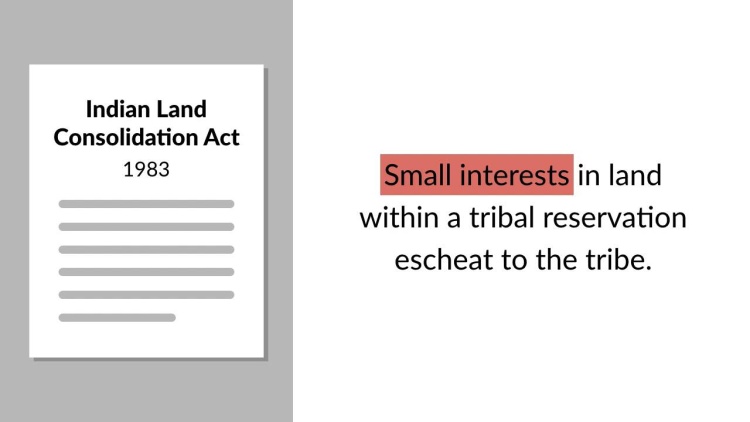Hodel v. Irving
United States Supreme Court
481 U.S. 704, 107 S. Ct. 2076 (1987)
- Written by Patrick Busch, JD
Facts
As one of the federal allotment statutes enacted in the late 1800s dividing Indian reservations into individual land allotments, the Sioux allotment statute provided for Sioux lands to be held in trust by the United States. Consequently, the lands generally could not be sold or partitioned and passed to subsequent generations as undivided interests, becoming increasingly fractionated with each subsequent generation. On January 12, 1983, Congress enacted the Indian Land Consolidation Act (act) to address this problem. Section 207 of the act barred the descent or devise of fractional interests in Indian land allotments that constituted 2 percent or less of the original allotment, requiring instead that the fractional interest escheat to the tribe. Three members of the Oglala Sioux Tribe—Mary Irving, Patrick Pumpkin Seed, and Eileen Bissonette (the Sioux tribe members) (plaintiffs)—brought suit in the United States District Court for the District of South Dakota, as heirs, devisees, or their representatives, against the United States secretary of the interior (United States) (defendant), asserting that the escheatment of 41 fractional interests under § 207 constituted a taking of the Sioux tribe members’ property in violation of the Just Compensation Clause of the United States Constitution. The United States asserted that escheatment under § 207 did not effect a taking because the property interests were de minimis or, alternatively, because the interests could have been conveyed inter vivos. On appeal to the circuit court of appeals, the court held in favor of the Sioux tribe members. The United States appealed to the United States Supreme Court.
Rule of Law
Issue
Holding and Reasoning (O'Connor, J.)
What to do next…
Here's why 904,000 law students have relied on our case briefs:
- Written by law professors and practitioners, not other law students. 47,100 briefs, keyed to 995 casebooks. Top-notch customer support.
- The right amount of information, includes the facts, issues, rule of law, holding and reasoning, and any concurrences and dissents.
- Access in your classes, works on your mobile and tablet. Massive library of related video lessons and high quality multiple-choice questions.
- Easy to use, uniform format for every case brief. Written in plain English, not in legalese. Our briefs summarize and simplify; they don’t just repeat the court’s language.





